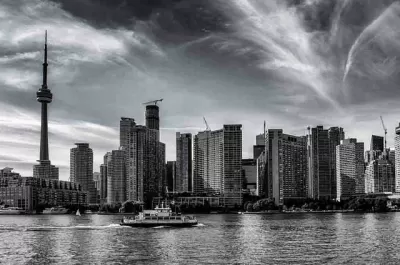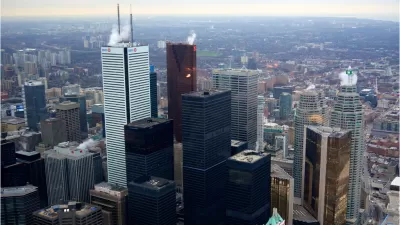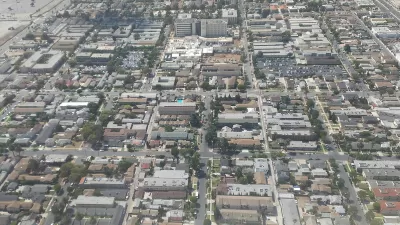Local control loses ground to provincial preemption north of the border.

"The Ford government has rejected the City of Toronto’s plans for the areas of Yonge and Eglinton and the downtown core, with the municipal affairs minister saying the plan needs to allow for denser housing near transit hubs," reports Chris Herhalt.
Toronto approved two amendments to its official plan for the downtown core and the Yonge and Ellington area in July 2018, with Official Plan Amendments 405 and 406, but Municipal Affairs and Housing Minister Steve Clark says the changes do not reflect the priorities of the provincial government, and returned the amendments with modifications.
Herhalt describes the differences of opinion between the two versions of the plan amendments:
In the city’s original plan amendment for Yonge and Eglinton, buildings constructed immediately adjacent to Eglinton Station were restricted to a height of 58 storeys on the northeast corner, 65 floors on the southeast corner and 27 to 37 floors on the northwest corner, with generally lower height restrictions on areas flowing out in each direction from the intersection.
The Ford government’s changes would allow tower of up to 35 floors to be built farther afield from the intersection.
A lot of Herhalt's coverage of the developing story is focused on the reaction of Toronto Mayor John Tory to the news. "He said he’s 'mystified' as to why he was not told ahead of time and still is not sure what exactly the province disliked about the city’s plans," according to Herhalt.
While the Doug Ford Administration is pushing Toronto to increase density in the interior of the city, Premier Ford is also on the record calling for the city to expand its greenbelt, thus allowing more sprawling development on the city's periphery. The downtown core and Yonge and Eglinton plan amendments are also only the latest in a series of political battles pitting city against province. Differences on inclusionary zoning and a provincial takeover of the city's subway system have also made waves since Doug Ford took office.
FULL STORY: Tory 'mystified' by Ford government's rejection of plans for Yonge-Eg, core

Planetizen Federal Action Tracker
A weekly monitor of how Trump’s orders and actions are impacting planners and planning in America.

Maui's Vacation Rental Debate Turns Ugly
Verbal attacks, misinformation campaigns and fistfights plague a high-stakes debate to convert thousands of vacation rentals into long-term housing.

San Francisco Suspends Traffic Calming Amidst Record Deaths
Citing “a challenging fiscal landscape,” the city will cease the program on the heels of 42 traffic deaths, including 24 pedestrians.

Amtrak Rolls Out New Orleans to Alabama “Mardi Gras” Train
The new service will operate morning and evening departures between Mobile and New Orleans.

The Subversive Car-Free Guide to Trump's Great American Road Trip
Car-free ways to access Chicagoland’s best tourist attractions.

San Antonio and Austin are Fusing Into one Massive Megaregion
The region spanning the two central Texas cities is growing fast, posing challenges for local infrastructure and water supplies.
Urban Design for Planners 1: Software Tools
This six-course series explores essential urban design concepts using open source software and equips planners with the tools they need to participate fully in the urban design process.
Planning for Universal Design
Learn the tools for implementing Universal Design in planning regulations.
Heyer Gruel & Associates PA
JM Goldson LLC
Custer County Colorado
City of Camden Redevelopment Agency
City of Astoria
Transportation Research & Education Center (TREC) at Portland State University
Jefferson Parish Government
Camden Redevelopment Agency
City of Claremont





























